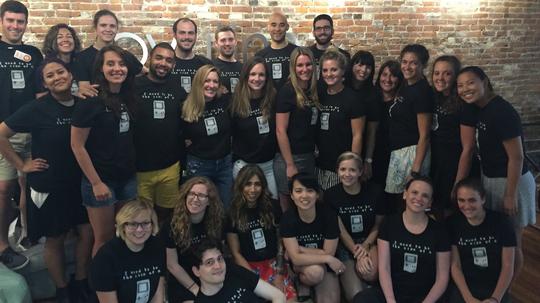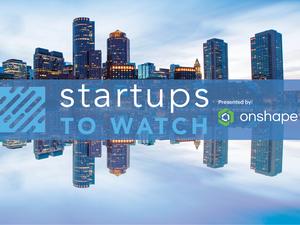
Well, here it is. It’s that time again when we showcase some of the most promising Boston startups to watch for the new year. To figure out who to highlight for 2017, we crawled through dozens of news reports from last year, talked to members of the local venture capital community and got some questions answered by companies, which I topped off with healthy dose of instinct. It might sound like a lot of work, but it’s actually easier than you think since we spend so much time talking to many of these companies throughout every year. The hard part is figuring out which ones not to include.
Since it’s 2017, we have upped the number of startups we’re highlighting to 17 (I feel bad for whoever has to do the post in the year 2050). Like last year, we are dividing our “startups to watch” coverage into two articles. This post covers startups with fewer than 50 employees while the second one coming out next week will cover startups with more than 50 employees.
So who made the list? Take a look:
Pillar Technologies
Last year was a big year for Pillar Technologies, a Somerville startup developing sensor technology for risk management at construction sites. Not only did it raise a seed round over the summer, but it was also accepted into Autodesk’s new BUILD Space startup accelerator in Boston and Techstars’ new Internet of Things Accelerator in New York. But that’s not all. Pillar Technologies was one of the two startups to win Forbes’ Change the World Competition at the publication’s Under 30 Summit in Boston, where it received an investment from Sound Ventures, the VC firm run by Ashton Kutcher and Guy Oseary, and Rough Draft Ventures.
Podium Data
With large companies accruing more and more data, there’s a greater need than ever to find new ways to quickly analyze that data. That’s where Podium Data comes in. Based in Lowell, the startup has developed what it says it the “industry’s first enterprise data lake management software platform.” That’s quite a mouthful, but what it really means is that its software takes large reams of data, often raw or unstructured, and converts it into formats that are easy to search and analyze. It raised a $9.5 million Series A round last fall, and it plans to increase its team of approximately 20 employees to 80 in the next two to three years.
Mautic
If you’re familiar with how Boston-based Acquia took open source content management system software and turned it into a large business, it can be easy to understand the potential behind Mautic. The Boston startup began as an open source marketing automation tool by David Hurley, but it launched as a business this past year with more than $5 million in funding from Boston VC firms G20 Ventures and Underscore.VC. Mautic’s free version of its software has already been downloaded more than 50,000 times. To help it take off, Mautic hired Matt Johnston, Applause’s former chief marketing and strategy officer, as its CEO.
Insurify
The easiest way to sum up Insurify is “Kayak for insurance.” After launching in January 2015, Insurify has already accrued at least 815 agents and 102 carriers, including Liberty Mutual and Metlife, on its artificial intelligence-assisted insurance comparison site. As of this past September, more than 500,000 shoppers have usedInsurify to compare, customize and buy car insurance, with the average shopper saving $378 on a policy. Founded and led by Snejina Zacharia, the startup has raised $2 million from investors. It has also expanded beyond its base offering with Evia, a virtual agent that provides insurance quotes via text message based on a picture of a car’s license plate.
Cogito
Here’s a real interesting company: Cogito is a Boston-based provider of voice analysis software that was originally based on research at the MIT Media Lab and later validated through a partnership with the Defense Advanced Research Projects Agency, also known as DARPA. While Cogito has used its software to help veterans cope with post-traumatic stress disorder, among other things, its big focus is selling to companies with large call center operations, which use the software to monitor and improve phone calls with customers. Humana and Blue Cross Blue Shield are among its customers, and it closed a $15 million round last fall.
Ovia Health
Formerly known as Ovuline, Boston-based Ovia Health is in the baby-making business. More specifically, its suite of apps aims to help women through the fertility and pregnancy processes, including giving them alerts on when they’re most fertile and if any symptoms of sickness during pregnancy could be dangerous. Beyond making the consumer apps, Ovia Health’s bigger play appears to be a maternity benefits platform for employers and insurers. To expand in this area, the startup raised $10 million last fall, and its platform is already used by GE, Activision Blizzard, Optum and Blue Cross Blue Shield of Massachusetts.
Nebulous
Is blockchain the future of data storage? Investors, including local firm Procyon Ventures, think so. This past fall, Nebulous raised a $750,000 round from Procyon, Raptor Group and two Chinese investors for its blockchain-based decentralized data storage technology called Sia. Essentially the startup is betting on a future where people are fed up with cloud storage services that mine your data for things like personalized ads. Sia’s big value proposition is that it lets you store your data as encrypted fragments across a peer-to-peer network, reducing storage costs and improving access speed.
Vesper
If you don’t own an Amazon Echo, you at least probably know how fast the voice interface technology space is growing, with Google, Microsoft and others racing to release competing devices. So where does Boston-based Vesper fit in? Well, it’s developing low-power, high-performance microphones that can be used in smartphones, connected cars, voice-controlled speakers and other devices that are riding the wave of voice interface tech. Speaking of Amazon, the company’s Alexa Fund invested in Vesper’s recent $15 million Series A round.
Blink
There’s a growing list of smart home security products out there, but how many people can actually afford them? Blink, an Andover startup, wants to solve that problem with wireless, high-definition security camera systems that start at $100, with no subscription required. Blink raised a $5.8 million round of capital last year, and it became profitable in its first year of sales, putting 250,000 units into the homes of consumers in 2015. The startup introduced a new DIY home security ecosytem at the 2017 CES that includes, among other things, a water sensor to detect flooding and entry sensors for doors or windows. It also revealed a new outdoor camera that costs $119.
Talla
Last year could have been called the year of the chatbot, with virtual assistants springing up on Facebook, Slack and other messaging platforms. Talla, a new venture started by Backupify founder Rob May, is making chat bots to help employees be more productive and work faster. Essentially, Talla can be used to build workflows within Slack to help employees with onboarding, collect feedback through polls and questionaries and create custom experiences. Over 2,000 companies now use Talla, which raised a $4 million round last year from Jason Calacanis's Launch fund and Avalon Ventures, among other investors.
CAKE
Have you ever given any thought about what your final wishes would be? How about what people should do on the anniversary of your death? Yes, these are heavy questions, but CAKE, a Boston startup, wants to make it easier for you to think about sensitive topics through its end-of-life planning software. The startup went through MassChallenge in 2015 and it’s now part of the inaugural PULSE@MassChallenge digital health accelerator. While CAKE is free for anyone to use, its bigger play is a paid concierge service that helps you and your family navigate the sometimes scary end-of-life planning process.
RateGravity
What happens when you bring two community bankers together who want to disrupt the home mortgage industry? You get RateGravity, a Boston startup that was one of MassChallenge’s $50,000 winners last year. The startup provides a way for homebuyers to compare mortgage offers from a network of local lenders, removing the salesperson from the equation — and that means no more large commissions. Last September, the startup was in the midst of raising a $1 million round.
Crayon
If you need a good way to keep tabs on your company’s competitors, don’t be surprised if you get recommend Crayon as an option. Led by HubSpot vet Jonah Lopin, the Boston startup tracks 117 million websites across 7.4 million domains and 2.3 million companies and uses machine learning to give insights to marketing teams about competitors, partners and organizations they aspire to emulate. Last November, the startup raised a $3.35 in seed funding from Eric Paley of Founder Collective, Mike Volpe and Yoav Shapira of Operator.VC and others.
BeautyLynk
BeautyLynk is an on-demand beauty services startup that was another $50,000 winner for last year’s MassChallenge awards. The idea is two-fold: create opportunities for beauty professionals while also making their services available to anyone, regardless of location. The startup is operating in Atlanta, Boston and Washington, D.C., with additional locations coming in 2017.
Accion Systems
Accion Systems is developing mini space propulsion systems, which can provide a literal boost to smaller satellites. The startup raised a $7.5 million Series A last May led by early Nest investor Shasta Ventures, with participation from RRE Ventures, Founder Collective and Slow Ventures. In additional to VC funding, the startup has also received $6.5 million from partnerships with the Department of Defense. When Accion talked to TechCrunch early last year, it said it had signed on two commercial customers and one government customer.
Wellist
This Boston digital health startup provides personalized recommendations to hospital patients for post-discharge services. After partnering with the Mass General Hospital Cancer Center and Beth Israel Deaconess Medical Center, Wellist has since expanded its offerings with a new service called Integrated Patient Experience Solutions, which provides patient experience assessments and analytics, in-hospital concierges and call center navigators, among other things. The startup has raised a $2.2 million seed round.
Neurable
Controlling computers with your brain is no longer a thing of fiction, thanks to startups like Boston-based Neurable. Based on a proof-of-concept study by former University of Michigan research Ramses Alcaide, Neurable is using machine learning to make the interaction between the brain and brain-controlled interface much faster than current solutions. To help the startup build out, it closed a $2 million seed round this winter. Investors include Brian Shin of BOSS Syndicate, Loup Ventures and NXT Ventures.








